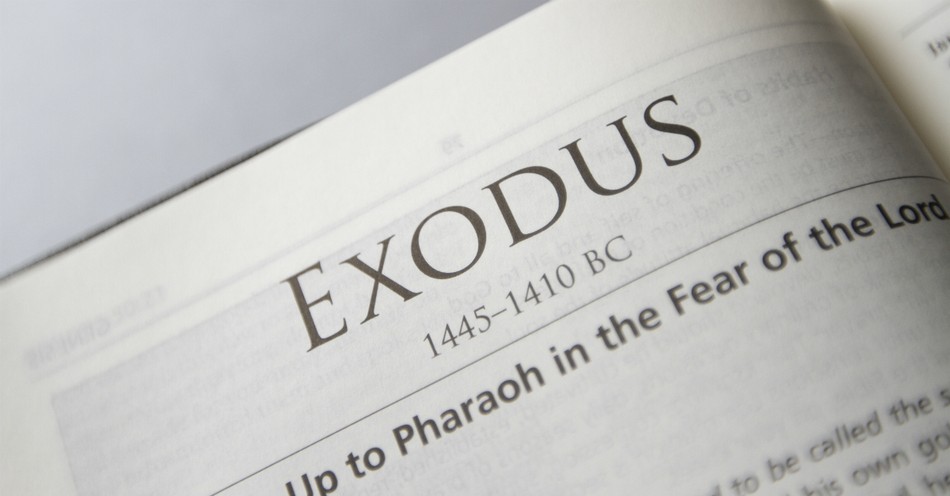An exodus is a departure or emigration, usually of a large number of people. It is most commonly used in the context of Scripture, meaning the departure of the Israelites from Egypt under Moses.
The book of Exodus not only tells some of the Bible’s most famous events, but the word means something that sums up the book’s entire message. When we consider “what does Exodus mean?” we reach the book’s core theme.
What Does the Word Exodus Mean?
The word Exodus came from the Latin exodos and was adopted as the book’s title when the Bible was translated into Latin. Exodos means leave, and the book of Exodus tells how the nation of Israel left Egypt. It chronicles the story of their deliverance from four hundred years of bondage and how God sent Moses as an instrument of deliverance. We also see how the Lord made Pharaoh release His people.
What Events Lead Into the Book of Exodus?
It is crucial to study the book of Genesis to understand Exodus. You must understand how Joseph was sold into slavery by his brothers (Genesis 37). Joseph ended up in Egypt away from his family and did not understand until decades later when his brothers came to Egypt why all these events occurred (Genesis 50:20). Joseph suffered many things because of his brothers. He had to mature in Egypt away from his family. His brothers gave him an unplanned exodus simply because his father adored him (Genesis 37:3-4). However, the plan of the Lord prevails. It was God’s will to use Joseph as a forerunner to prepare the children of Israel for what was next (Genesis 45:7-9).
The main focus of Exodus is to describe God’s deliverance of Israel and how He made them a great nation (The KJV Study Bible, Barbour Publishing, 2011). After Joseph and his generation died, a new king arose over Egypt who was not familiar with Joseph (Exodus 1:6-8). At this time, the children of Israel were fruitful, increased abundantly, became exceedingly mighty, and there were people everywhere.
Their numbers threatened the new Pharaoh. He feared that Israel would unite with Egypt’s enemies (Exodus 1:9). The children of Israel had become a threat, for the Egyptians might not control them. Not to mention, the Israelites were a faithful people who believed in God. The Egyptians worshipped gods created by their ancestors, but the Israelites kept their faith.
So, the Egyptians devised a plan to set taskmasters over the Israelites and enslave them. They made their lives miserable with hard labor (Exodus 1). They were oppressive to the Israelites and made them create bricks. The children of Israel did all work in the field as well.
Pharaoh also instructed the midwives to kill the male children during birth but spare the female children (Exodus 1:15-16). The Hebrew midwives feared God and would not do what the king of Egypt asked. God increased the midwives and gave them houses (Exodus 1:16-21).
The king of Egypt was still determined to kill the male children. He instructed his people to cast every male child born into the river (Exodus 1:22). When Moses was born (Exodus 2), he escaped this fate and became an instrument God used to deliver the children of Israel.
What is the Significance of the Word Exodus?
The word exodus is significant because it means “departure.” Israel was tired of being in bondage. Their people have been under the foot of the Egyptians for four hundred years. God is not a fan of bondage or suffering. There were many things that Israel had to learn during this process. One of the most important lessons was deliverance would only come from God. God is faithful. He had promised Abraham that his descendants would become a great nation (Genesis 17). We know that God is not a man that He should lie nor a son of man that He should change His mind (Numbers 23:19). If He said it, He will do it. If He spoke it, He will make it good (Numbers 23:19).
Anytime you hear the word exodus, it causes you to notice. If someone were to say there was a mass exodus across state lines, it is safe to assume that many people crossed the state lines. “An exodus of people left the company” means the same thing. It means “a lot of people quit and left.” Exodus is not used casually. Because of its significance and the power behind it, we use it gingerly. The dictionary highlights this when it points out the Biblical origin of the word (Merriam-Websters.com, 2022).
The exodus of Israel was not easy, and it took time, but it was a God kind of job. God did send Moses and protected him from all of the death decrees that the Pharoah had implemented to keep them down (Exodus 3-10). Moses knew he had a big job because Israel was no longer just one family. If you look at Exodus 1:5, you will see that seventy souls had come out of Jacob and arrived in Egypt with Joseph. After Joseph died, the children of Israel were numerous, a great nation.
Later, God commanded Moses to take a census of all the Israelite men over 20 years old, which amounted to “six hundred thousand and three thousand and five hundred and fifty.” (Numbers 1:46). This is already the size of many metropolitan cities and doesn’t count the men’s female relatives or the men under 20 years. Some scholars estimate that if we factored in those groups and other factors, there would have been as many as 3 million Israelites exiting Egypt. God was faithful to his promise that Abraham’s descendants would number the stars in the sky (Genesis 26:4).
What Can We Learn from Exodus Today?
What does Exodus mean today? As we established, Exodus means to leave or depart. There is usually a large number of people making an exodus. If you have been following global events, the people of Ukraine are making an exodus because the Russians have invaded their country. There are many Christians in Ukraine. Many are crying out to God, and He hears them.
There are many things and situations where people make an exodus. We can learn from the book Exodus that the Israelites continued to cry out to God until He delivered them. We can cry out to God, and He will hear us. The Bible says God is near the brokenhearted (Psalms 34:18).
We also can learn that sometimes we will wander in the wilderness until we get our acts together. God delivered Israel, but many things had to be worked out of them. Understand they had been among people with idol gods. Israel remained in the wilderness for forty years. Some people did not enter the promised land that God had promised to give them because of their disobedience.
Some died on the spot for murmuring and complaining about Moses (Numbers 16:33). That is a topic for another article. We can be disgruntled about what is happening with our pastor or whoever our leader is. We must start by praying for them, seeking what God will do. Most importantly, we must get in the Word of God and ask for God’s help. We must remember that those who teach and lead are held to higher accountability (James 3:1).
Sometimes, people feel ready to make the big exodus from study to leadership, but they have not been released into ministry yet. God is God, and He can manage timelines as well. The Bible says, “Study to show thyself approved unto God a workman that needed not be ashamed rightly dividing the word of truth” (2 Timothy 2:15). Prepare yourself. There is a saying that success is when preparation meets opportunity. I honestly believe that. I also believe that humans will not stop the plan of God.
Photo Credit: ©Sparrowstock


_639003522088907085.jpg)

